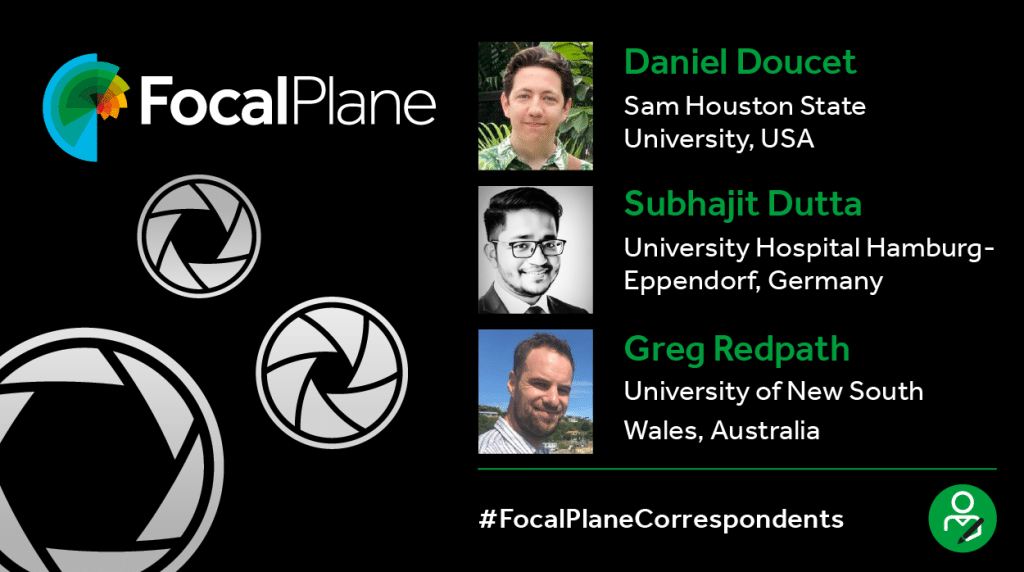Announcing the 2024 FocalPlane correspondents
Posted by FocalPlane, on 1 February 2024
We are delighted to announce that we are continuing our FocalPlane correspondent programme and in 2024 we will be working with Daniel Doucet, Subhajit Dutta and Greg Redpath. They will benefit from a programme of writing groups, webinars and workshops coordinated by the in-house team at The Company of Biologists and will produce approximately six blog posts over the course of the year. We introduce our correspondents briefly below, and stay tuned for longer interviews!
In 2023, we were lucky enough to work with Mariana De Niz and Mai Rahmoon as our FocalPlane correspondents. As well as continuing her Latin American Microscopists interview series, Mariana also started a ‘Towards Global Access‘ blog series. Mai’s posts focussed on microscopy communities and has, so far, published blog posts about the Advanced Imaging Centre at Janelia and Euro-Bioimaging and Global BioImaging. We are looking forward to continuing to working with them in 2024, but we’d like to thank them for all their fantastic posts over the past year!
Our correspondent scheme is run along with our sister site, the Node. You can meet their new correspondents here.

Daniel completed his schooling at Sam Houston State University in Huntsville Texas, with his master’s thesis work focusing on the variability present in scale morphology of lizards and snakes. Currently, he works as the lab coordinator for the Microscopy Center at Sam Houston. He assists faculty, industry partners, and graduate students new to formal research with imaging through SEM, TEM, fluorescence microscopy, and a variety of sample prep protocols. Daniel plans to address areas where macro-biology meets microscopy as well as the balance of research and education at imaging core facilities in his writing for FocalPlane.
Subhajit is a graduate researcher at the Institute for Biochemistry and Molecular Cell Biology at University Hospital Hamburg-Eppendorf in Germany. He is exploring advanced imaging techniques using spinning disk, super-resolution, two-photon, microscopy as well as micropatterns to study the directional decision making of cells. His work focuses on cancer cell migration and organelle crosstalk impacting metastasis. As a correspondent, he is eager to share the latest research and developments in cancer cell biology, the challenges and triumphs of Asian-origin cell biologists and microscopists, and ethical considerations shaping the future of microscopy research. He is keen to learn new microscopy and image analysis skills, and looking forward to expanding his network within the cell biology community.
Greg is a postdoctoral fellow in the Department of Molecular Medicine, University of New South Wales in Sydney, Australia. Greg’s research focuses on using live cell imaging to understand how receptor trafficking is regulated and contributes to human diseases and treatments. His work involves investigating how psychedelics act on serotonin receptors at a cellular level, how lipoproteins are cleared from circulation, and how receptor movement around the cell regulates their signalling. Greg’s posts will focus on the incredible array of biosensors and optogenetic tools to understand signalling in live cells, interviewing leaders in the Oceania region and those around the world developing and using these tools, and provide perspectives from Indigenous researchers in Australia and New Zealand.


 (No Ratings Yet)
(No Ratings Yet)